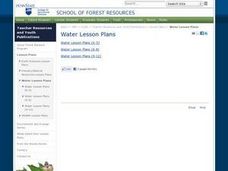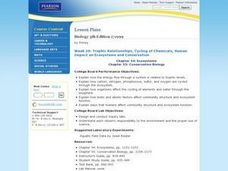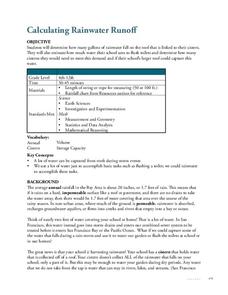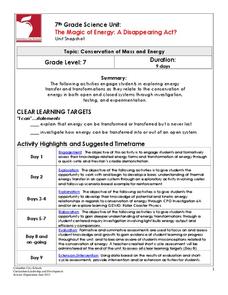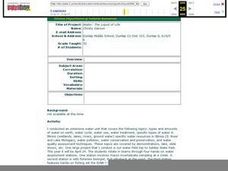Curated OER
"Pennsylvania Watersheds, Many Ways to the Sea"
Students trace a molecule of water through the water cycle including each of its three loops. They describe why evapotranspiration demands the largest portion of total precipitation falling on a forested watershed.
Curated OER
Trophic Relationships, Cycling of Chemicals, Human Impact on Ecosystems and Conservation
Students explore how the energy flow through a system is related to trophic levels. They investigate how organisms affect the cycling of elements and water through the biosphere. Students participate in lab activities to observe ways...
Curated OER
Water Under the Bridge
Students consider how much water they use on daily basis by investigating and recording their own patterns of water use over two weeks, and discover ways to begin conserving water in their own homes. Culminating field trip to local creek...
Curated OER
Fresh or Salty?
Students explore water bodies on the planet Earth and their various uses and qualities. They examine several ways that engineers are working to maintain and conserve water sources and think about their role in water conservation....
Curated OER
Commonalities and Differences from Africa to Cleveland as Evidence Through the Gullah Community Connection
Students explore Afro-American history. They identify the commonality between African, Carolinian and Cleveland Black culture. Students explore the water cycle, oceanography, hydrology and bio-geochemical processes. They discuss the...
Curated OER
Measure It Up!
Students investigate the states that water may take. In this physical science lesson, students read the book, Water: Up, Down, and All Around and recall the states of water from the book. Students examine how water takes the shape of its...
Curated OER
Our Space Station Earth
Students discover ways to preserve the Earth's resources. In this natural resources lesson, students investigate how many gallons of water the average American uses per day and then total their estimated usage. Students discuss the...
Techbridge Curriculum
Calculating Rainwater Runoff
Thirsty plants soak up every bit of a rainfall, but what happens to the rain that hits the roof? Calculate the amount of rainwater from your school's roof with an Earth science activity, which brings measurement skills, observation...
Curated OER
WaterWeb
In this water activity, students answer 10 multiple-choice questions about the water cycle. Students also describe how they think their community is involved in sustaining water resources and write a pretend radio announcement about...
Captain Planet Foundation
Rotting Away
What happens at the end of a plant's life cycle? Show kids the natural way that plants show that they're decomposing, as well as the importance of compost, with a lesson about living organisms. After reading Log Cabin by Anne Schreiber,...
Curated OER
Pollution is Not a Solution
Students explore the environment by completing science worksheets in class. In this water conservation lesson, students identify ways water is used in our society and how we abuse the privilege. Students discuss methods to reduce water...
Curated OER
Marjory Stoneman Douglas
Pupils explore Marjory Stoneman Douglas and her contribution to the ecosystems and National Parks.
Illinois Department of Natural Resources
Section Two: Why is Biodiversity Important?
Explore soil, genetic traits, natural resources, and pollution in a series of lessons that focus on biodiversity. Kids complete experiments to learn more about the importance of varied genes and organisms in an ecosystem.
Curated OER
Waterdrops
In this science learning exercise, students learn the importance of water conservation by completing 6 pages in the color newsletter. Students list ways their school could save water, read cartoon tips for home water conservation and...
Curated OER
Not a Drop to Drink
Students explore potential issues of a water shortage. For this water conservation lesson, students brainstorm the many uses of water and what life would be like if there was not enough water available.
Serendip
How Do Biological Organisms Use Energy?
When an organism eats, how does food become energy? Young biologists follow glucose through the process of cellular respiration to the creation of ADP using a discussion-based activity. The resource also highlights conservation of mass...
Columbus City Schools
The Magic of Energy: A Disappearing Act?
Using the 5E method for teaching about kinetic energy, potential energy, and conservation of energy, this two-week unit with many videos and possible extensions is sure to keep pupils engaged as they are learning.
Curated OER
Water Use and Conservation
Students discuss the different types of water found on Earth. They discover why not all water is used for drinking and calculate how much water they use. They create their own water conservation plan.
Curated OER
Water Conservation
Students create short videos about water conservation using the computer program iMovie in this cross-curricular lesson provided by the Florida Center for Instructional Technology.
Curated OER
Water: The Liquid of Life
Sixth graders complete a lesson plan on the properties, types and amounts of water on Earth. In groups, they travel between stations to identify water resources in Illinois and pollution sources. They complete the lesson plan with a...
Curated OER
Water Quality
In this unit of lessons, 2nd graders examine the water quality of the water on the planet. They discover how much water is on the planet and how to conserve their water usage.
Curated OER
The Hudson's Ups and Downs
Even rivers have tides. Older elementary schoolers will discuss the Hudson River and how weather, water craft, and the ocean cause tidal fluctuation. They will examine a series of line graphs that depict tidal fluctuation, then analyze...
Curated OER
Water 3: Melting and Freezing
Learners understand that most substances may exist as solids, liquids, or gases depending on the temperature, pressure, and nature of that substance. This knowledge is critical to understanding that water in our world is constantly...
Curated OER
Aquatic Science and IPC
Students explain the importance of water in our daily lives. In this aquatic science lesson, students identify different ways to purify water and make it potable. They design and construct a water filter based on researched information.
